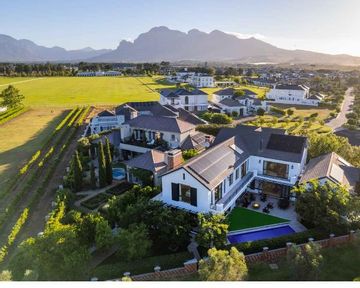Ongoing record-low interest rate bolsters property market confidence
Faced with recent setbacks to the economic recovery and with inflation hovering close to the mid-point range of the inflation target, as widely anticipated, the Monetary Policy Committee’s stance remains supportive of the economy by keeping the repo rate at near five-decade lows (3.5%). This means the prime interest rate holds steady at 7%, says Dr Andrew Golding, chief executive of the Pam Golding Property group.
“Given the underlying weakness and uneven recovery in the economy, market commentators ahead of today’s announcement included a call for the first hike to be delayed for as long as possible – even until 2023, depending on inflationary pressures and any potential shift in the inflation target.
“From a housing perspective, the prevailing low interest rates have undoubtedly bolstered market confidence, coupled with favourable lending conditions seeing both average (trailing effective) and first-time buyer approval rates rising further in August (2021), increasing to 82.6% and 81.2% respectively, according to ooba.
“Moreover, after increasing in Q4 2020 and Q1 2021, deposits as a percentage of purchase price are again declining, with average and first-time home buyer deposit rates converging at around 7% in August, while the overall approval rate for 100% home loans rose marginally in the same month to 82.8%. (Source: ooba)
“According to the Pam Golding Residential Property Index, while national house price inflation continues to lose momentum as economic growth slows in Q3 2021, easing from a peak of 5.2% in May to 5% in August, the sub-R1 million price band continues to enjoy uninterrupted growth, averaging at 5.8% for the year to date (to August 2021).”
“Bucking the national trend, the Western Cape is the only major regional market in which house price inflation continues to accelerate, with house price inflation averaging 5.8% during the year to date, compared to 4.7% in both Gauteng and KwaZulu-Natal.
“In addition, according to Lightstone, the coastal price premium versus non-coastal homes continues to widen, reaching 2.9% in May 2021 (latest data) and averaging at 2.2% for the year to date, compared to just 0.2% in 2020.
“According to ooba, the average price of homes sold rebounded in August, rising to R1.4 million overall and R1.13 million for first-time buyers – the latter approaching January 2021’s record high.
“Notably, at R113 billion, the total value of residential property transfers in South Africa during the first half (H1) of 2021 was 35.4% above H1 2019, while units were 12.3% higher at approximately 114 000 (Lightstone data). This robust improvement from pre-Covid levels of activity underlines the ongoing resilience of the country’s housing market, underpinned by consistent demand for correctly priced homes across all price bands, particularly the sub-R5 million category - but also including luxury residences,” concludes Dr Golding.
While grateful for this decision, Adrian Goslett, Regional Director and CEO of RE/MAX of Southern Africa, remains cautious for when interest rates will begin their inevitable upward climb. As predicted in his response to the interest rate announcement back in January this year, Goslett stated that it was unlikely that we would see interest rates climb this year but still advised homeowners to leave room in their budget for a possible increase.
“It is no secret that SARB governor Lesetja Kganyago hopes for the inflation target to be lowered to 3% over time and at every MPC meeting thus far, up-coming interest rate hikes have been mentioned. I would caution homeowners and new buyers to take these warnings seriously and make sure there is provision within their budgets to allow for an increase of at least 25 basis points at any point in time,” Goslett cautions.
As things stand, keeping interest rates stable will go a long way towards helping debt holders keep up with repayments within an already struggling economy. “Unemployment rates are at an all-time high. Unless things start to change and the economy is allowed to open up further, this does not bode well for the local housing market. Rising unemployment often leads to an increase in the number of repossessed homes and an increase in the number of homeowners who are forced to downscale. In time, this will then have a negative impact on housing values,” Goslett explains.
That being said, the property market continues to be incredibly active and is performing better than expected ever since COVID hit last year. “This speaks into the reality that, no matter how badly the economy performs, people will always need a place to live. I am not sure if and when the property market will become less active and take a turn for the worse, but what I am sure of is that those who view owning a home as a long-term investment will inevitably enjoy good returns if they have made smart investment choices. Those who hope to make these smart investment choices should seek the advice of their nearest RE/MAX agent who can keep them up-to-date on the latest market conditions and any new opportunities as and when they arise,” he concludes.
As we head to the local elections and given the economic destruction of the July riots, the country needs stability and a rapid return to economic growth, says Samuel Seeff, chairman of the Seeff Property Group.
This is great news for buyers and will continue supporting activity and recovery of the property market.
"We expect the interest rate to remain flat into next year as there is simply no reason for the SARB to start their hiking cycle," he says. South Africa’s GDP recovery is lagging other G20 countries. Globally, central banks continue their aggressive stance of keeping interest rates low to stimulate economic recovery.
"South Africa has essentially already had three lockdowns with a potential fourth predicted for early December despite the vaccination roll-out. On top of that, after four quarters of positive GDP growth, the economy is expected to again contract in the third quarter as a result of the July riots," he adds
Adding that for as long as the economy is not fully open, we run the risk of higher inflation and rising job losses. There has been no overspending in the economy due to the low interest rate. Rather, we are seeing imported inflation. Even so, the inflation rate remains within the SARB’s target range and the currency remains fairly resilient.
Seeff, therefore, remains of the view that the SARB should have considered a 25bps cut to boost sentiment and encourage businesses to invest in the economy so that we can get onto the growth path so desperately needed.
"As we have seen, the historic rate cuts, which have reduced borrowing costs by about 30%, have had an enormous impact on the residential property market. It is probably one of the few industries which have recovered to pre-pandemic levels, and we need to retain the activity," says Seeff.
Further saying that with new stock coming into the market it remains one of the best times to buy property in decades. Mortgage lending conditions remain favourable, and the average deposit requirement is now down to around 8.75%, almost unheard of since 2007.
While the market has come off the highs of the second half of 2020, Seeff hopes it will pick up over the summer months which is traditionally busier for certain markets. That said, he cautions that we continue to operate in uncertain times, and we will need to keep monitoring the market.

